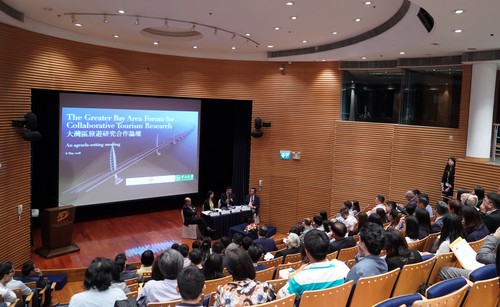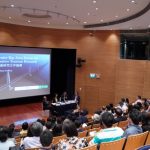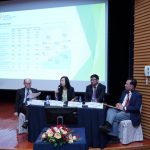 The Greater Bay Area Collaborative Tourism Research Forum
The Greater Bay Area Collaborative Tourism Research Forum
On 8 May, Macao’s Institute for Tourism Studies’ Tourism Research Centre (ITRC), the School of Tourism Management, Sun Yat-Sen University (SYS), and the School of Hotel and Tourism Management, Hong Kong Polytechnic University (HKPU) jointly organised The Greater Bay Area Collaborative Tourism Research Forum. The Forum was unique because of its working and interactive format with the audience, which was designed for the purpose of defining a collaborative research agenda for tourism stakeholders in the Greater Bay Area. The Forum provided an opportunity for hospitality and tourism policymakers, industry executives, and researchers in the Greater Bay Area to discuss, identify and prioritise future joint research needed to address the myriad challenges and opportunities regarding the long-term tourism development of the Greater Bay Area.
The Greater Bay Area (GBA) Cooperation Framework signed by the governments of Guangdong Province, Hong Kong SAR and Macao SAR on 1 July 2017, brought forth an urgent need for collaborative research efforts to advance the collective development of the GBA. Because the GBA is now integrating rapidly in terms of economic development, infrastructure projects, transportation connections, and more frequent people-to-people exchanges, such changes raise important questions in terms of tourism development and tourism policy which future joint research need to address.
The Forum was comprised of two sessions. The first consisted of short statements delivered by the three Co-Chairs of the Forum, wherein they broadly outlined some key issues, trends, developments, and rationales for cooperation. The Co-Chairs of the Forum included Professor Jigang Bao, Dean of the School of Tourism and Management, Sun Yat-Sen University, Professor Haiyan Song, Associate Dean and Chair Professor of the School of Hotel and Tourism Management, Hong Kong Polytechnic, and Dr. Fanny Vong, President of IFT.
The second session consisted of participants being broken down into several smaller groups during which they held intense and interactive discussions and shared their opinions as to what issues, problems, and challenges were most pressing and important for research to address.
As Host of the event, President of IFT, Dr. Fanny Vong delivered her welcome remarks which underscored the need for tourism and hospitality stakeholders in the GBA to work together and coordinate much needed research.
During the Forum, most of the discussions that took place with the participants centered on diverse but relevant topics and yielded several key ideas for research which included, among others:
- The long-term impacts of greater tourism activity on the GBA
- The sustainability of tourism development for communities in the GBA
- Tourism management coordination, promotion, and cooperation between the different cities of the GBA
- Even and balanced tourism development for both sides of the Pearl River Delta
- The impacts on travel mobilities of large infrastructure projects such as the Hong Kong-Zhuhai-Macao Bridge
- The creation of joint destination branding, image, and marketing of the GBA
- Tourism products and attractions development across the GBA
A total of 110 participants registered for the event, including representatives from HKP, SYS, and IFT, as well as other higher educational institutions in the GBA. Other participants included community members from across the GBA policy-makers, government officials, industry executives, and members of various community interest groups, think-tanks and private associations.
View gallery


